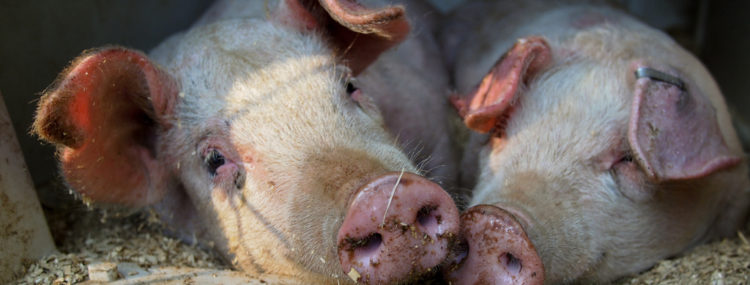
What The Backyard Farmer Should Know About Raising Pigs
Pigs are one of the most adorable creatures on the planet. (Even when they aren’t piglets anymore.) As your backyard farm grows, purchasing piglets and beginning your own swine operation at home can be profitable and a lot of fun. Before you dive in, however, there’s a bunch you should know about pigs from how they should be kept to the importance of GMO-free pig feed.
The Lingo
Pigs go by several names—swine, hogs, and of course, Wilbur—and it’s important for an aspiring backyard farmer to understand what others are talking about when discussing pig production and maintenance. Here are some terms to familiarize yourself with:
- Shoat – a pig which hasn’t yet reached maturity; typically weighs less than 120 pounds.
- Gilt – a female pig that has not yet produced a litter.
- Sow – a female pig that has farrowed (given birth) at least one time.
- Boar – a male pig that has not been castrated.
- Barrow – a male pig that has been castrated before reaching sexual maturity.
- Hog – this is actually a technical term for a pig weighing more than 120 pounds.
- Creep feeder – this is special pig feed just for piglets that is high in protein to provide energy.
- Finish pig – this is an animal that you have fed particularly to reach his ideal weight for slaughtering. It is also known as a grower pig which weighs anywhere between 40 and 220 pounds.
- Butcher pig – is when the pig has met that ideal weight of between 220 and 260 pounds and is ready for slaughter. (This typically occurs around six months of age.)
There are, of course, many other terms to learn, but what you specialize in will really be determined by your decision to breed pigs or to raise them for meat.
Caring For Your Pigs
Pigs are highly intelligent creatures, and as such, they require very particular care. Most people ignore the fact that the animals we raise for food in the United States are severely mistreated. When you keep pigs on your backyard farm, you are able to raise them in a high quality environment with all the space and GMO-free pig feed they deserve.
Living Space
Your pigs’ ability to thrive outdoors is very much a result of their breed. Some kinds of pigs have more fat than others making colder weather a non issue, and surprisingly enough, that rough pig skin is very sensitive and susceptible to sunburn. Pigs should have access to the outdoors where they can move around and by “piggy”, but they also need a good shelter—a shelter that is strong enough to withstand all of their shenanigans. A pig pen should have a fence of at least four feet high, as those chubby little swine are quite talented jumpers when they want to be. The area where they live should have excellent drainage in case of flooding or extreme rain. There should be plenty of straw on the ground for pigs to make themselves beds with.
Keep Things Clean
Pigs have a bad reputation for being filthy animals, and nothing could be farther from the truth. Swine are actually very clean, and they prefer everything compartmentalized so they need separate areas for eating, sleeping, and relieving themselves. The whole rolling in the mud thing is just a pig’s way of cooling himself down during the hot summer months. Proper shade and even some fans are good measures to take it you’d prefer that your pigs stay mud-free when the temperatures go up.
GMO-Free Pig Feed
Backyard farmers have the opportunity to do everything right because they can raise their animals according to the principles they believe in and their own moral compass. GMO-free pig feed is essential for the backyard farmer who trusts nature to do its job and wants to raise the most high-quality, organic pork around. Using the right pig feed (and in the right capacity) will give your hogs the competitive edge when it comes time to sell—piglets or pork. Better ingredients mean a better product. There’s no substitute for quality.
Jeff Mattocks confirms, “For sure, you go non-GMO. The marketplace is so hungry for good local food that anybody could do it.” If you are looking to supply your family with GMO-free pork, great. If you’d also like to make a profit, that’s awesome too. Look to local farmers markets where you’ve got a health conscious audience built right in as well as local family-owned restaurants that might need a supplier.
Pigs And Backyard Farming
Caring for pigs can be a very satisfying experience, and a very profitable one if you go about it properly. For the backyard farmer just starting out, chickens are a great way to ease yourself into caring for livestock, and pigs might just be the next best animal to raise. As with everything in life, preparation is key, and you’ll get out of this experience exactly what you are willing to put into it.

Comments are disabled for this post